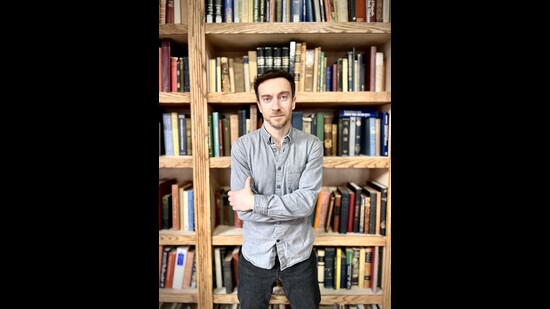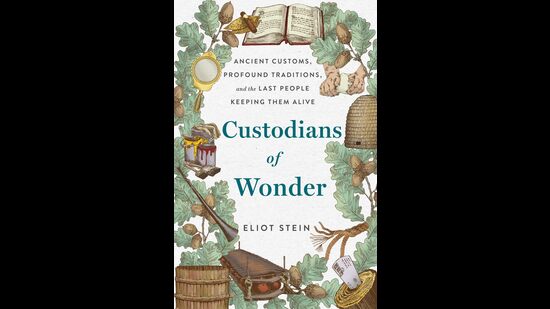Eliot Stein: “We’re becoming a more homogenous species”
The author of ‘Custodians of Wonder’ on how the world loses its diverse nature when the keepers of culture disappear and localism gives way to internationalism
Eliot Stein grew up outside of Washington, DC in Silver Spring, Maryland, “a progressive, multicultural bubble that looks a lot like what the rest of the US will one day become”. “I was raised Quaker, a religion that encourages meditation, espouses non-violence and maintains that everyone has a light within and a story to share. I suppose these two factors led me towards a life of listening, empathy, and interest in those from other cultures,” he says. Stein studied journalism and Italian at university, and moved to Italy the day after he graduated. Currently a senior journalist and editor at the BBC, his new book, Custodians of Wonder, is inspired by Custom Made, a column for which he travelled around the globe profiling those preserving extraordinary cultural rites across the world.


How did you choose these 10 stories to tell?
I tried to cast a wide geographic and thematic net so these 10 stories weren’t only set in one continent or were only about one type of tradition. But more than anything, I focused on remarkable rites that have shaped a place’s unique culture and identity in profound ways.
Each of the 10 customs I focus on in this book is a reflection of a community’s unique world view. This book isn’t just about an astonishingly rare pasta in Sardinia you may never taste or a grass-braided bridge in Peru you may never cross; it’s about the gorgeous, gentle, irrational things humans do that make the world so wondrously diverse and what it means when these quiet customs, that remind us where we came from, what we believe in, and who we are, fade away.
What was the most amazing thing that you learnt while writing this book?
The most fascinating part of this project was discovering how each of these age-old wonders reveals an even more extraordinary truth about a place and its people.
By meeting the unlikely heir to a mythical West African instrument, readers will learn how the Mali Empire was both one of the richest and most secretive empires in the medieval world. In getting to know the world’s last Inca bridge master, we discover how these suspended, grass-woven marvels helped the Inca create the largest empire ever seen in the Americas. And by encountering the only three women alive who know how to make the world’s rarest pasta – a dish so delicate and difficult to master that it’s known as “the threads of God” – readers will understand why the Romans were never able to conquer the rugged and rebellious heart of Sardinia, and how that past is still present on the island today.
Tell us about the India story in Custodians of Wonder?
For hundreds of years, an extended family of alchemists in Kerala has been tightly guarding the recipe for a mysterious metal mirror that is believed to reveal your truest self. It’s called the Aranmula kannadi, and because it’s front-reflecting and therefore more accurate than a standard plane mirror. It’s said that you’ve never truly seen yourself until you’ve gazed into it.

For Keralites, keeping an Aranmula kannadi in your home is believed to bring prosperity and luck. It is often given as a gift at weddings, births, and housewarming ceremonies. It’s also one of the eight auspicious items included in the ashtamangalyam set used in Hindu holy rites. And while most mirrors around the world today are simply used to gauge physical appearance, in Kerala and throughout much of the Malabar Coast, they also serve as instruments of introspection to examine one’s body as well as one’s soul.
Today, it is believed that only 26 people alive know the mirror’s exact proportions of copper, tin, and trace elements, and I had the honour of getting to meet many of these individuals. One of the great heroes of this book is Sudhammal J. Her father revealed the mirror’s secret formula to Sudhammal just before he passed, and his dying wish was that she maintained this family tradition. Sudhammal is now one of the only women in history to have ever made the Aranmula kannadi. But after a recent once-in-a-lifetime flood, the future of these sacred mirrors and the unsung alchemists who cast them remains in doubt.
What do you think these stories tell us about the world in the past and the world we live in today?
Each of these customs developed in an isolation that’s virtually impossible to replicate today in our ever-connected world. When localism gives way to internationalism, we often lose the distinct vestiges that make our world so wonderfully diverse, and this global homogenisation is happening before our eyes. Nine languages disappear every year, and if we don’t do anything to halt this linguistic loss, more than half of the world’s languages will be extinct in the next 100 years. More than 6,000 foods and culinary practices are on the brink of disappearance. Nearly 3,000 villages in Spain are at risk of becoming ghost towns; 2,500 in Italy are perilously depopulated; and 896 towns and villages across Japan are estimated to disappear by 2040 as better-paying jobs lure young people to cities – a phenomenon the country’s former minister for internal affairs described as “local extinction”.
As people increasingly speak the same languages, live in the same cities, eat the same foods, and adhere to the same customs, we’re becoming a more homogenous species. None of this bodes well for those who travel to be stirred by the unfamiliar and enthralled by the boundless depths of how the natural world affects human expression. Nor does it for the endangered artisans and final custodians preserving knowledge that would otherwise fade away. In many ways, these guardians are the closest thing we have to humanity’s wise men and women.

What do you think we are likely to lose if these custodians prove to be the last?
While culture is an ever-evolving force, what’s at risk of being lost with these custodians’ disappearance is nothing less than the world’s local, whimsical soul.
When these threads that have bound generations together begin to unravel, a certain mastery disappears with it. We, collectively, lose something. From a 15th-generation Inca bridge builder to a 27th-generation West African griot to an unbroken line of women whose needle-thin pasta has united an island for centuries, these custodians and their families have given something special to a place – a certain knowledge, a skill – and in doing so, helped shape its identity.
But because the specific thing that each custodian embodies is often a reflection of a larger community’s unique worldview, this makes these quiet deaths doubly tragic: not only do we lose someone who has dedicated their whole life to mastering a specific artistry, we also lose a different way of understanding the world.
As the distances and differences between us continue to diminish, I can’t help but feel that we can learn something by looking toward these customs and custodians. Together, they remind us that culture is born slowly through a million tiny, personal moments; when one seemingly insignificant wonder fades, an irretrievable part of our humanity vanishes with it.
Teja Lele is an independent editor and writes on books, travel and lifestyle.
All Access.
One Subscription.
Get 360° coverage—from daily headlines
to 100 year archives.



HT App & Website






